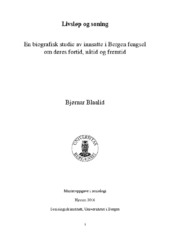Livsløp og soning: En biografisk studie av innsatte i Bergen fengsel om deres fortid, nåtid og fremtid
Master thesis
Permanent lenke
https://hdl.handle.net/1956/15527Utgivelsesdato
2016-09-07Metadata
Vis full innførselSamlinger
- Department of Sociology [429]
Sammendrag
Denne studien tar for seg et utvalg innsatte i Bergen fengsel og beskrivelser fra deres liv ved en åpen avdeling, ved bruk av biografiske dybdeintervjuer. Utgangspunktet for studien er hvilke hendelser i livet som var avgjørende for at de endte opp som innsatte i fengsel. Her bygger datamaterialet på de innsattes egne beskrivelser og opplevelser. Oppgaven tar for seg tre overordnede sider ved de innsattes liv: Beskrivelser hentet fra hverdagen i fengselet. De innsattes fortid og levde liv og de innsattes forventninger knyttet til fremtiden. Ut fra et livsløpsperspektiv inspirert av Glenn Elder sine arbeider, fortolkes så de innsattes beskrivelser kontekstuelt ut fra den sosiale og strukturelle rammen de inngår i. For å få kunnskap om de innsatte har valget falt på å gjennomføre en kvalitativ og eksplorerende empirisk studie med utgangspunkt i «grounded» metodologi. Oppgavens overordnede forskningsspørsmål: Hvilken betydning har hendelser i livsløpet hatt for at respondentene ble satt i fengsel, og videre for det livet de ønsket å leve etter soning? Noen funn/implikasjoner av studien: En implikasjon ved å se på innsatte i et livsløpsperspektiv, er at perspektivet i stor grad innbyr til åpenhet rundt hva de innsatte selv vektlegger som viktig på innsiden av fengselet. Med åpenhet rundt de innsattes situasjon på innsiden, gir det samtidig samfunnet på utsiden en bedre forståelse for hva innsatte gjennomgår. Her kan det tenkes at åpne fengsler bidrar på en positiv måte, ettersom de innbyr til at innsatte kan ha mer kontakt med verden utenfor enn de ellers ville ha gjort på mer lukkede avdelinger Framework and theme: This master thesis in sociology aims to broaden the field of life course studies on inmates. By using a life course perspective inspired especially by the works of Glen Elder the main goal is to understand how the inmates ended up in prison by having them describe their past, present and visions for the future. Method: The study was carried out by using biographical approaches were 8 male inmates were interviewed about their lives from the age of 14 and up until today. Methodology: In this empirical study a "Grounded Theory" approach was used inspired by the "Grounded Theory" formulated by Glaser & Strauss. After analyzing the material and information the inmates gave in the interviews 4 main typologies were developed. The typologies were: Rationally planned agents, society drop-outs, Professional career and the impulsive. The inmates were then sorted into the different categories by using the information they had described form their lived lives. The typologies then served as a way of constant comparative Method were the discussion centered on which social factors or events that were key in affecting the inmates. How they transitioned throughout their lives and ended up in new positions were also of interest. Key findings/open prison discussion: The main findings is that a life course approach is ideal for understand the inmates in a deeper way than would be possible otherwise. It also shows that inmates have quite different stories. They have different backgrounds and have different thoughts about their future lives. By looking at the whole story one can better understand why they ended up in prison, and one can better understand what the prisoners need to get back into society in a good way. The study also concludes that an open prison in many ways is a good way to make the transitions easier for the inmates. Open prisons allows more contact with the outside world which benefits the inmates. It also makes their planning easier as they have more time on their hands and are allowed into job/school programs.
